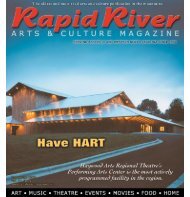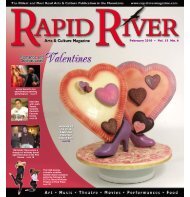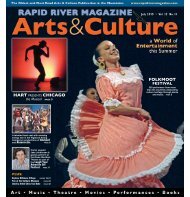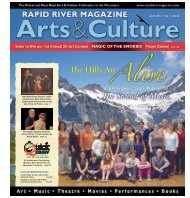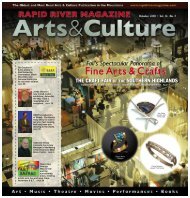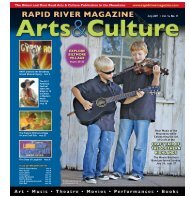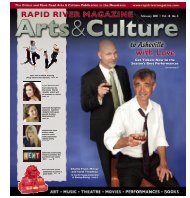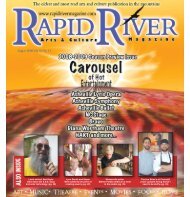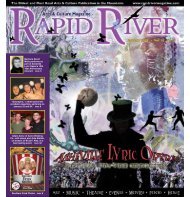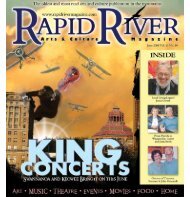JOHN MAC KAH - Rapid River Magazine
JOHN MAC KAH - Rapid River Magazine
JOHN MAC KAH - Rapid River Magazine
Create successful ePaper yourself
Turn your PDF publications into a flip-book with our unique Google optimized e-Paper software.
R A P I D R I V E R A R T S & C U L T U R E M A G A Z I N E<br />
poetry & poets<br />
An Evening of<br />
Poetry in Translation<br />
Friday, May 6<br />
Come sip a glass of wine and listen<br />
to five area poet-translators read their<br />
English-language adaptations of great<br />
works by Hafiz, Pablo Neruda, Federico<br />
García Lorca, Guillevic, Katalin<br />
Ladik, Yvan Goll, Claire Goll, Marc<br />
Ichall, Keszthely Reszo, Stella Vinitchi<br />
Radulescu, and Hugh-Alain Dal.<br />
This event, part of Asheville’s Word-<br />
Fest weekend, features works from<br />
French, Spanish, German, Hungarian<br />
and Farsi. Each of the translators—<br />
Thomas Rain Crowe, Emöke B’Racz,<br />
Nan Watkins, Luke Hankins, and<br />
Caleb Beissert—is a published poet in<br />
his or her own right.<br />
Thomas Rain Crowe’s reading will<br />
be accompanied by music, as well as<br />
Caleb Beissert’s reading, which will<br />
feature Aaron Price on piano. The<br />
main readings will be followed by a<br />
poetry open mic.<br />
IF<br />
YOU<br />
GO<br />
An Evening of Poetry in<br />
Translation, Friday, May 6<br />
at 9 p.m., doors open at 8<br />
p.m. At the Altamont, 18 Church<br />
Street, Asheville, NC. Suggested<br />
donation of $10, or $5 for students.<br />
Arrive early to ensure seating. Visit<br />
www.ashevillewordfest.org for more<br />
information.<br />
Asheville Wordfest<br />
Poetry events and readings will take<br />
place around Asheville May 2-8.<br />
The festival includes screenings<br />
of The Day Sandburg Died, at 7<br />
p.m. on Tuesday, May 3, and 1 p.m.<br />
on Sunday, May 8 at the Fine Arts<br />
Theater. The documentary, Poetry of<br />
Resilience, by Katja Esson, will be<br />
shown at the Fine Arts Theater on<br />
Thursday, May 5 at 7 p.m.<br />
Readings by local poets Britt<br />
Kauffman, Luke Hankins, Mendy<br />
Knott and Rose McLarney at 4<br />
p.m. on Friday, May 6 at Grateful<br />
Steps,159 S. Lexington.<br />
The William Matthews Poetry Prize<br />
winners will read Saturday, May 7 at<br />
the YMI Drugstore at 4 p.m. Landon<br />
Godfrey and Holly Iglesias read at 7<br />
p.m. at the YMI Cultural Center.<br />
All poetry events are free. Films $10<br />
donation. Visit www.ashevillewordfest.com<br />
for more information.<br />
Robert Bly and “The Winged Energy of Delight”<br />
The most widely-read among the<br />
many books by poet Robert Bly are<br />
his prose works of popular sociology,<br />
especially the best-selling Iron<br />
John: A Book about Men (1990).<br />
Indeed, Bly’s public persona as a leader<br />
of the men’s movement has somewhat<br />
overshadowed his many literary accomplishments,<br />
including his approximately twenty<br />
collections of poetry (one of which—1967’s<br />
The Light Around the Body—received<br />
the National Book Award for Poetry); his<br />
thought-provoking edited anthologies, such<br />
as News of the Universe: Poems of Twofold<br />
Consciousness; his books of literary criticism,<br />
including American Poetry: Wildness<br />
and Domesticity<br />
and<br />
Leaping Poetry; and<br />
his translations of international poets.<br />
In translations, critical writing, and<br />
public lectures over the past half-century,<br />
Bly has championed poets from<br />
other nations, other literary traditions,<br />
and other eras. In the<br />
process he has played a major<br />
role in introducing American<br />
readers to such classic poets<br />
of the Middle and Far East as<br />
Kabir, Rumi, Ghalib, Mirabai,<br />
Basho, and Issa; such major<br />
twentieth century Western<br />
poets as Ranier Maria Rilke,<br />
Pablo Neruda, Cesar Vallejo,<br />
and Juan Ramon Jimenez; and<br />
such powerful if less familiar<br />
European voices as Georg<br />
Trakl, Tomas Transtromer,<br />
Gunnar Ekelof, and Rolf<br />
Jacobson. Bly’s translations<br />
of poems by these and several<br />
other poets form the core of<br />
the 2004 book The Winged<br />
Energy of Delight: Selected Translations.<br />
Unwaveringly practicing the elusive<br />
art/craft of poetry translation since his<br />
formative years in the 1950s, Bly viewed the<br />
perspectives of poets from other cultures<br />
as providing an antidote for the rampant<br />
cultural conformity and social repression of<br />
Cold War America. To Bly, translation was<br />
a way out of that America—and a way in to a<br />
deeper level of experience.<br />
“During the Fifties,” he conveys in<br />
the introduction to The Winged Energy of<br />
Delight, “there was very little sense in the<br />
poetry community [in the U.S.A.] of contemporary<br />
European and South American<br />
poetry. While in Norway a few years later I<br />
found Paal Brekke’s anthology Modernistisk<br />
Lyrikk [ The Modern Poem]. He included<br />
one poem apiece by seven or eight lively<br />
poets from each of the major European<br />
countries. There was a great freshness in<br />
many of these poets. How was it that I had<br />
TRANSLATING THE WORLD’S POETRY<br />
BY TED OLSON<br />
never seen the names of Trakl, Ekelof, or<br />
Vallejo in contemporary American magazines?<br />
Many of these poets engaged in an<br />
explosive attention to metaphor.”<br />
As Bly came to believe, metaphor was<br />
the ideal vehicle for unlocking the world’s<br />
mysteries (Bly’s term for this process,<br />
“deep image,” refers to the use of metaphorical<br />
language to plumb the depths of<br />
the natural world and the human collective<br />
unconscious). The Winged Energy of De-<br />
light<br />
features many examples of the kind<br />
of “deep image” poem that Bly particularly<br />
values, such as “The Cable Ship” by the<br />
Swedish poet Harry Martinson (1904-<br />
1978), who was awarded the 1974 Nobel<br />
Prize for Literature:<br />
We fished up the Atlantic Cable one day between the<br />
Barbados and the Tortugas,<br />
held up our lanterns<br />
and put some rubber over the wound in its back,<br />
latitude 15 degrees north, longitude 61 degrees west.<br />
When we laid our ear down to the gnawed place<br />
we could hear something humming inside the cable.<br />
“It’s some millionaires in Montreal and St. John<br />
talking over the price of Cuban sugar, and ways to<br />
reduce our wages,” one of us said.<br />
For a long time we stood there thinking,<br />
in a circle of lanterns,<br />
we’re all patient fishermen,<br />
then we let the coated cable fall back<br />
to its place in the sea.<br />
In his headnote to the Martinson section<br />
of the book, Bly conveys his fascination for<br />
the work of this particular poet: “Often Martinson’s<br />
poems, by their sheer grace, shoot<br />
into the future and become prophetic.” Such<br />
an interpretation is anything but academic in<br />
tone, and all of Bly’s headnotes in this book<br />
reflect the translator’s passion for the varieties<br />
of poetry produced throughout the world.<br />
All of the book’s translations are enlivened by<br />
the release of the “winged energy of delight”<br />
from universally meaningful poems that were<br />
originally ushered into existence by people<br />
who communicated in various “foreign,”<br />
otherwise (to us) unfamiliar languages.<br />
To Bly, “[t]ranslating allows one to<br />
go deeply into the adventures taking place<br />
inside another person’s poem.” Need it be<br />
said that, had Bly (and a few of his contemporaries,<br />
especially poets W. S. Merwin<br />
and James Wright) not devoted enormous<br />
energy to translating the world’s poetry over<br />
the past half-century, at least two generations<br />
of Americans might never have had the<br />
kinds of life-enhancing adventures that such<br />
translations render possible.<br />
Ted Olson is the author of<br />
such books as Breathing<br />
in Darkness: Poems<br />
(Wind<br />
Publications, 2006) and Blue<br />
Ridge Folklife<br />
(University Press<br />
of Mississippi, 1998) and<br />
he is the editor of numerous<br />
books, including CrossRoads:<br />
A Southern Culture Annual<br />
(Mercer University<br />
Press, 2009). His experiences as a poet and<br />
musician are discussed on www.windpub.<br />
com/books/breathingindarkness.htm.<br />
Poets who would like for their poetry to be<br />
considered for a future column may send their<br />
books and manuscripts to Ted Olson, ETSU, Box<br />
70400, Johnson City, TN 37614. Please include<br />
contact information and a SASE with submissions.<br />
Winter’s Wane<br />
Billowy islands of light<br />
float across waning blue<br />
Masquerade as soft,<br />
lofty views:<br />
Curious, luminous shapes<br />
with vast silences.<br />
Pale smoke rises<br />
from old chimneys<br />
Curls its scent<br />
around dense<br />
fir limbs<br />
Circumscribes vague frames<br />
makes hazy contours,<br />
Infiltrates lungs<br />
and marrows of bones,<br />
Correctly guessing<br />
the dormancy<br />
Of latent green things<br />
accustomed now to<br />
Dark, brittle cold.<br />
Thick grey sky<br />
drips bits of drizzle,<br />
Cool, simple soak<br />
coating streets with glossy,<br />
Patent polish.<br />
Thin dark bands of vapor<br />
lurk and glide slowly,<br />
Inky above din and bustle<br />
watching forsythia<br />
Erupt in yellow<br />
And willows’ long stringy<br />
hair go green.<br />
~ Kirsten M. Walz<br />
26 May 2011 — RAPID RIVER ARTS & CULTURE MAGAZINE — Vol. 14, No. 9



